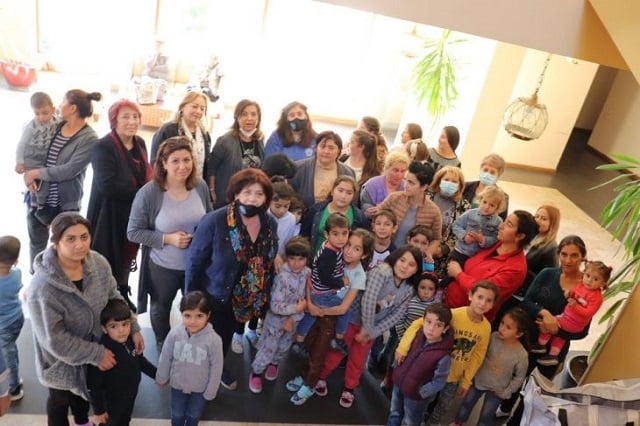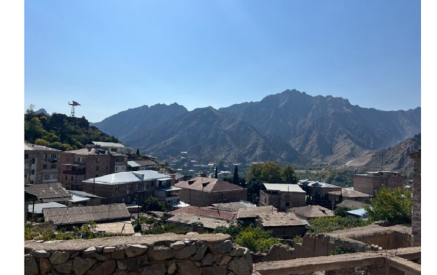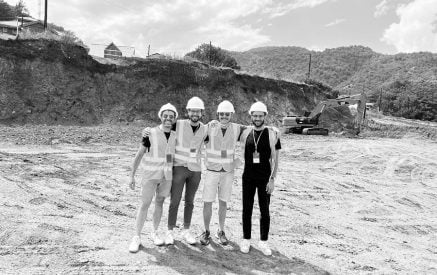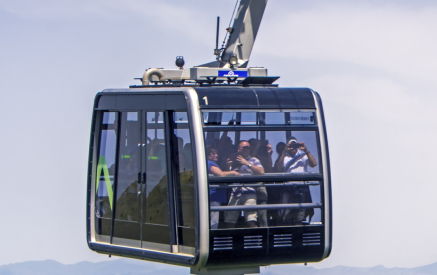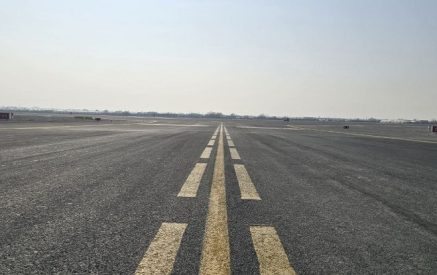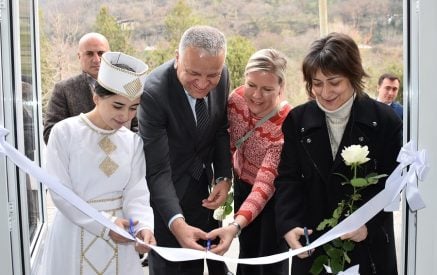ԵՌԱԳՈՅՆ. From the early days of the Artsakh war, the Armenian Relief Society has been active in Armenia and Artsakh by providing our soldiers on the frontlines with medical needs, purchasing an off-road ambulance and utilizing the ARS Akhuryan “Mother and Child” Center ambulance to help with transport.
Amid the COVID-19 pandemic and the ongoing war, the leadership of the ARS was on the ground assessing the situation and taking appropriate measures to support and assist our compatriots.
The war has forced tens of thousands of people from Artsakh to flee their homes facing an uncertain future. Families from Artsakh arrived in various cities in Armenia during and after the war for their safety while their sons and husbands were at the frontlines. Following the tripartite agreement that was signed on November 10, and with minimal warning, many families were forced to relocate without having time to pack their belongings to move to safety before specific territories were going to be handed to Azerbaijan.
With the wounds of the war extremely fresh, the ARS, along with its various regions and chapters, launched a series of initiatives to assist in the recovery efforts and the aftermath of the war.
Read also
On November 22, the ARS launched a program which will provide 1,000 displaced families with financial assistance for the next four months. Each month, these families will receive $250 to assist them with nutrition, basic clothing needs and their communal expenses. The ARS is asking for your donations to help us support this initiative.
On November 30, the ARS began collecting donations from the public for its “Amanor” (new year) program. The program provides those less fortunate with a Yuletide celebration and gifts. Traditionally, the program provides much-needed financial assistance to institutions for the purchase of Christmas gifts for children and senior citizens in Lebanon, Syria, South America, Bulgaria, Armenia, Artsakh and Javakhk. The annual Amanor program is made possible through the efforts of ARS entities where each member contributes $3 to help maintain this program. This year, the ARS is asking for $10 donations to provide additional Christmas gifts to the children of Artsakh, as well.
Additional aid initiatives are expected to be announced in the coming weeks.
In the last few weeks, to address the immediate needs of displaced Artsakh families who are spread all across Armenia, the ARS has been delivering winter clothes, food and COVID-19 protection kits. ARS Regional and Central Executive Board members have been visiting various villages and towns a few times a week in order to provide these families with much-needed resources for the upcoming months.
The ARS took over the responsibility of providing meals for one month to 165 displaced residents of Artsakh who have currently found shelter in Zvartnots.
From the start of the war, the ARS members have been visiting wounded soldiers in various hospitals to assess their needs and provide them and their families with the necessary support.
Additionally, the ARS allocated special funds to support all of its “Soseh” kindergarten employees.
On October 27, 100 warm jackets—sewn and designed in Armenia and gifted by a company to ARS Armenia—were distributed to families from Artsakh in the villages near Sevan.
On October 30, thanks to the continued generosity and support of Code3Angels, local ARS members visited six homes in the village of Mughni and provided assistance to multiple families sheltering in these homes. Unfortunately, some of these families were originally displaced from Sumgait following the pogroms only to be displaced again due to the most recent war.
On November 1, with the help of its local Hrazdan chapter, the ARS was able to visit Aghveran to distribute food, warm clothing and toys to more than 80 residents who had taken refuge in a hotel. The food was donated to the hotel, which has been providing three meals a day for the past month without receiving any compensation from the government. These families were from Stepanakert, Martuni and Martakert.
On November 3, the ARS visited Proshyan and provided support to 35 displaced families from Artsakh who had taken up temporary refuge in a village that was home to 18 soldiers on the frontlines. The village of Proshyan has given many of its sons over the years for our right to survive and our continued determination.
On November 24, after carefully assessing the needs of displaced families from Artsakh, the ARS made a visit to Tsaghkadzor where winter coats, boots, warm clothes and food were distributed to 68 displaced individuals.
The local ARS leadership of Armenia has been working diligently to evaluate the circumstances of displaced families from Artsakh in order to best assess their many needs. Through these efforts, ARS representatives have visited the Kanaker-Zeytun Hayortyats Tun where 80 people from Artsakh, primarily from Shushi and Hadrut, were temporarily residing. The ARS leadership also visited the dormitories of Brusov State University of Yerevan where many displaced families from Stepanakert, Askeran, Shushi and Hadrut, among others were also housed temporarily.
During every visit, local ARS members spend time interacting with each and every family, listening to their stories and making sure each child receives the attention that they deserve. While assisting families from Artsakh, the ARS also supports the local economy by purchasing products that are solely made in Armenia.
The ARS has a long history of assisting our people. Our humanitarian aid record, which spans over a century, is a testament of our commitment and remains true to our mission. Thanks to the efforts, support, dedication and determination of our members, we can maintain high standards of service and continue to provide a quick response in times of need.
Help us continue our mission of supporting our compatriots in our Homeland.
The Armenian Relief Society founded 1910, is an independent, nonsectarian, philanthropic society serving the humanitarian, social, and education needs of Armenian and Non-Armenians alike. The ARS operates in 27 different countries providing aid to local and international communities.




















































